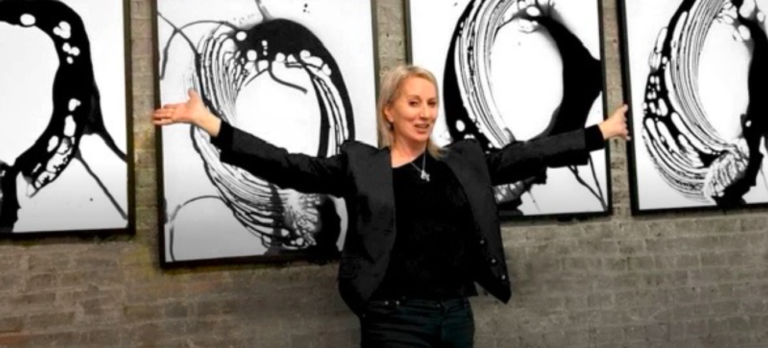Cynthia Karalla emerges as an alchemist, activist, and experimental artist, both in the physical and digital realms. Trained initially as an architect-turned-photographer and later in fine arts, Karalla’s work transcends traditional norms, challenging perceptions and navigating the intricate tapestry of post-digital existence.

At the heart of Karalla’s creative process lies a profound metaphor – the act of turning negatives into positives, akin to the alchemical transformation she explores in her works. In a world marked by chaos and digital disarray, she sees the development of film not just as a technical process but as a tool to redirect vision and reframe our understanding of the world around us.
One of her works, “The Baby Grand Piano,” stands as a testament to Karalla’s audacity and ability to challenge societal taboos. This photomontage, crafted meticulously over two years in Southern Italy and New York City, features 88 penises—52 white and 36 black—digitally assembled to form a 60-inch piano keyboard. The Grand Piano is not merely a visual spectacle; it’s a deliberate exploration of a societal taboo, inviting participants and viewers to reassess their relationship with this powerful subject.
In a world where discussions about the penis are often relegated to hushed tones or dismissed altogether, Karalla’s creation encourages a reexamination of cultural attitudes towards this intimate aspect of human anatomy. Women, breaking societal norms, played a pivotal role in bringing men to Karalla for participation. The faceless donors, stripped of identity and class, emphasize the universality of the subject, transcending cultural and geographical boundaries.
Karalla, through her art, creates a community of transgression, challenging cultural restrictions and prompting viewers to confront forbidden knowledge. “As an artist, I am constantly exploring the barriers that culture imposes,” she notes, inviting contemplation on what might transpire if these restrictions were to loosen their hold.
Karalla’s work is not confined to the studio; it extends into the diverse landscapes of New York City and the rural south of Basilicata, Italy. The juxtaposition of these contrasting locales forms the backdrop for her projects, breathing life into them through the active participation of the communities. Whether draped in the solemnity of Catholic tradition or embracing the freedom of urban America, her projects serve as a catalyst for community engagement and self-reflection.
Participants in Karalla’s projects find themselves grappling with challenging questions, questioning their beliefs, cultural upbringing, and identity within their communities. The artist becomes a catalyst for cultural dialogue, urging individuals to confront the uncomfortable and redefine their understanding of societal norms.

